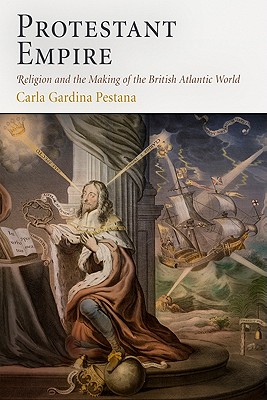

 University of Pennsylvania Press
University of Pennsylvania Press
Protestant Empire: Religion and the Making of the British Atlantic World


Key Metrics
- Carla Gardina Pestana
- University of Pennsylvania Press
- Paperback
- 9780812221503
- 8.9 X 5.9 X 1 inches
- 1.14 pounds
- History > United States - Colonial Period (1600-1775)
- English
 Secure Transaction
Secure TransactionBook Description
The imperial expansion of Europe across the globe was one of the most significant events to shape the modern world. Among the many effects of this cataclysmic movement of people and institutions was the intermixture of cultures in the colonies that Europeans created. Protestant Empire is the first comprehensive survey of the dramatic clash of peoples and beliefs that emerged in the diverse religious world of the British Atlantic, including England, Scotland, Ireland, parts of North and South America, the Caribbean, and Africa. Beginning with the role religion played in the lives of believers in West Africa, eastern North America, and western Europe around 1500, Carla Gardina Pestana shows how the Protestant Reformation helped to fuel colonial expansion as bitter rivalries prompted a fierce competition for souls.
The English--who were latecomers to the contest for colonies in the Atlantic--joined the competition well armed with a newly formulated and heartfelt anti-Catholicism. Despite officially promoting religious homogeneity, the English found it impossible to prevent the conflicts in their homeland from infecting their new colonies. Diversity came early and grew inexorably, as English, Scottish, and Irish Catholics and Protestants confronted one another as well as Native Americans, West Africans, and an increasing variety of other Europeans. Pestana tells an original and compelling story of their interactions as they clung to their old faiths, learned of unfamiliar religions, and forged new ones. In an account that ranges widely through the Atlantic basin and across centuries, this book reveals the creation of a complicated, contested, and closely intertwined world of believers of many traditions.
Author Bio
Carla Gardina Pestana, Professor and Joyce Appleby Endowed Chair of America in the World, studies the 17th and 18th century Atlantic worlds, especially the English Atlantic; the Caribbean; and U.S. religious history.
Carla Gardina Pestana received her Ph.D. at UCLA in 1987 in early American history. Before joining UCLA’s faculty in 2012, she taught at The Ohio State University, Canterbury University in Christchurch, New Zealand, and Miami University in Oxford, Ohio.
Professor Pestana has published books on religion and empire in the seventeenth and eighteenth centuries. Her first book, Quakers and Baptists in Colonial Massachusetts, considered illegal religious communities in New England’s less tolerant colony. Protestant Empire: Religion and the Making of the British Atlantic World (2009), explored the religious transformation brought by English expansion into the Atlantic world.
On the subject of empire, she authored The English Atlantic in an Age of Revolution, 1640-1661 (2004), a study of the effects of revolutionary upheaval in England, Ireland, and Scotland on England’s nascent empire.
She is also the co-editor with Sharon V. Salinger of Inequality in Early America (1991), a volume of essays honoring their dissertation advisor, Gary B. Nash.
Also with Salinger, she compiled and edited a multi-volume collection of primary texts on the early English engagement in the Caribbean, for British publishing house Pickering-Chatto, entitled The Early English Caribbean, 1570-1700.
The Belknap imprint at Harvard University Press published Pestana’s The English Conquest of Jamaica: Oliver Cromwell’s Bid for Empire
At the Huntington Library she delivered a public lecture on that project, in connection with her position as Robert C. Ritchie Distinguished Fellow.
Listen to the talk here: Oliver Cromwell’s Consolation Prize? The English Conquest of Jamaica--http://www.huntington.org/audio/2016_0302_oliver_cromwells_consolation_prize.mp3
Here latest book, also with Belknap/Harvard, is The World of Plymouth Plantation (2020): https://www.hup.harvard.edu/catalog.php?isbn=9780674238510.
Between 2016 and 2018, she blogged for the Huffington Post; follow this link to read posts: http://www.huffingtonpost.com/author/cgpestana-346
Her teaching interests range over similar fields to those explored in her publications. She contributes her expertise in early American history, the history of American religion, piracy, and the history of the early modern world. She has taught undergraduate courses on Atlantic history and early American history, on the history of American religion, as well as on such topics as Salem witchcraft, Plymouth Plantation, and pirates in the Caribbean.
Professor Pestana teaches the introductory course for first year U.S. graduate students, History 246A (U.S. History and Historiography to 1800). Her 14A course, History of the Atlantic World, was offered for the first time in 2019. She offers occasional Fiat Lux courses, on topics including THE GLOBAL CLIMATE CRISIS OF THE SEVENTEENTH CENTURY, the novel WOLF HALL considered as an exercise in historical revision, THE ADVENTURES OF HENRY PITMAN (a seventeenth-century prisoner of war, indentured servant, runaway and physician), and the contrasting national origin stories associated with 1619 and 1620.
She is the immediate past President of FEEGI (Forum on Early-Modearn Empires and Global Interactions); an OAH Distinguished Lecturer, 2016-2022; a member of the editorial board of the American Historical Review ; and a member of the Nominating Committee for the AHA, 2020-22.
Source: University of California Los Angeles - Social Sciences Division
Videos






Community reviews
Write a ReviewNo Community reviews